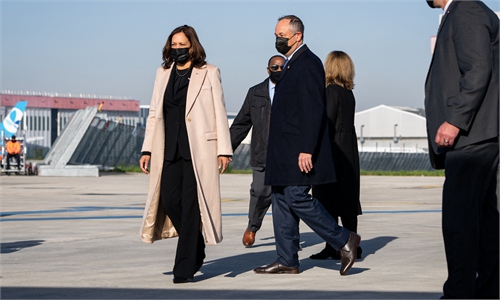
Crowds of the masked and the unmasked went through the security line at Hartsfield-Jackson International Airport in Atlanta, the US, on April 19, 2022 after the airport issued a statement saying masks are now "optional for employees, passengers, and visitors" at the airport. Photo: VCG
As the EU and the US are moving ahead with their adjusted responses to COVID-19 despite avoiding saying that "the pandemic is over" after warnings from the World Health Organization (WHO), countries, including China, must be prepared for increased risks of the virus spreading and mutating rapidly, as Western countries plan to scale down their anti-epidemic efforts and relax travel restrictions, Chinese experts warned on Thursday.
For China, which continues to adopt the dynamic zero-COVID strategy, experts suggested that the country should be well-prepared for future reopening, including accelerating the vaccination drive among elderly people, increasing medical resources such as intensive care units (ICUs) and antiviral drugs. As soon as more Western countries reopen, China could face growing pressure in stopping imported cases, experts noted.
EU officials announced on Wednesday that the 27-nation bloc is moving out of the emergency mode in dealing with the COVID-19 pandemic by proposing a set of actions to prepare for the next phase, citing lower levels of COVID-19 infections in member states. Those countries were invited to apply coordinated rules to ensure free and safe travels within the continent and internationally. Also, under the new phase, testing will be limited and monitoring of the virus will also be significantly scaled down.
Almost simultaneously, the US government's chief medical adviser Anthony Fauci said that the US is moving out of the pandemic phase, as the country has been recording declining new infections and the number of hospitalizations has also been dropping, according to US media reports. However, Fauci further clarified on Wednesday that his comment had been mischaracterized by some to mean that pandemic is over.
"We're not over the pandemic. Don't let anybody get the misinterpretation that the pandemic is over. But what we are in is a different phase of the pandemic," he said.
Like Fauci, EU officials reiterated the need to be cautious in the management of COVID-19 by stressing that the pandemic is not over. Margaritis Schinas, vice president of the EU Commission, also said on Wednesday that the COVID-19 pandemic is not over and the virus is here to stay.
"While the health situation is improving, we must prepare for different scenarios, and do it in a coordinated way. New variants are not a question of if but rather a question of when," Schinas said.
"The EU is moving to a new phase with the aim of striking a balance between a COVID response and social and economic development, especially when immunity rates have reached a high level in some countries," Chen Xi, an associate professor of public health at Yale University, told the Global Times on Thursday.
For example, in the US, when the public has reached a relatively high level of immunity, when the new variant occurs, it won't trigger a new wave of hospitalizations. Under such a circumstance, social and economic activities could gradually resume, Chen said.
The US CDC said nearly 220 million people, or 66 percent of the US population, are fully vaccinated. Of that number, 100 million have also received their first booster dose, NPR reported on Wednesday.
While the US and the EU have been cautiously moving toward a new phase, WHO officials warned that it's not the time to let the guard down. WHO Director General Tedros Adhanom Ghebreyesus on Tuesday warned that reduced testing for COVID-19 has left the world blind to the epidemic and the virus' mutations.
"This virus won't go away just because countries stop looking for it. It's still spreading, it's still changing, and it's still killing," he told a press briefing on Tuesday.
The WHO, which has the authority to declare a pandemic, has not announced that the pandemic is over, and such vigilance is based on the consideration of inequality in access to antiviral drugs and different vaccination rates across the world, a senior expert at the Chinese Center for Disease Control and Prevention told the Global Times on Thursday.
"It's also unpredictable if the virus would mutate to have much greater transmissibility and lethality," he said, noting that the WHO could not take any adventurous move by announcing that the pandemic is over when many countries are not ready yet.
While China has been adopting strict and decisive measures in fighting Omicron-triggered outbreaks in cities like Shanghai, the country has been adhering to its dynamic zero-COVID policy that has proven effective in keeping the death rate at a very low level, protecting people's lives at maximum level.
However, as more Western countries reopen and resume cross-border travel and business, such transition into a new phase of dealing with COVID-19 could bring new challenges to China in stopping imported cases, experts said.
"There are some urgent tasks. For example, driving up the vaccination rate among elderly people in China to above 80 percent in the next six months and increasing the number of ICUs and antiviral drugs to boost the medical capabilities for future reopening," Chen said.




